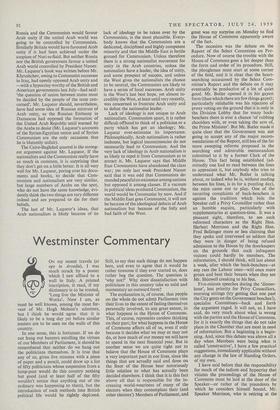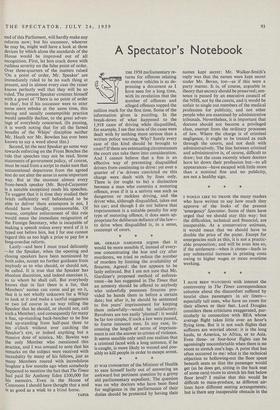Westminster Commentary
In one sense, this is fortunate. If we do not hang out banners extolling the virtues of our Members of Parliament, it should be remembered that neither do we hang out the politicians themselves. It is true that any of us, given five minutes with a piece of paper and a pencil, could draw up a list of fifty politicians whose suspension from a lamp-post would do this country nothing but good (and at least half of the fifty wouldn't notice that anything out of the ordinary was happening to them), but the introduction of such methods into British political life would be rightly depl3red. Still, to say that such things do not happen here, and even to agree that it would be rather tiresome if they ever started to, does rather beg the question. The question is 'why not?' Why does dissatisfaction with politicians in this country take so mild and momentary an outward form?
The explanation is, of course, that people on the whole do not admit Parliament into their lives to the extent of feeling themselves personally involved, to any great extent, in what happens in the House of Commons. This, of course, represents careless thinking on their part; for what happens in the House of Commons affects all of us, even if only because it decides what we may or may not do, or how much of our money we will have to spend in the next financial year. But in another sense we are quite right not to believe that the House of Commons plays a very important part in our lives, since the things that are actually said and done on the floor of the House bear notoriously little relation to what has actually been decided elsewhere. I think that it is this fact above all that is responsible for the in- creasing world-weariness of many of the electors when they contemplate their (and other electors') Members of Parliament, and great was my surprise on Monday to find the House of Commons apparently aware of the fact.
The occasion was the debate on the Report of the Select Committee on Pro- cedure. Now of course the trouble with the House of Commons goes a lot deeper than the form and order of its procedure. Still, the ploughman must start at some corner of the field, and it is clear that the heart- searching occasioned by the Select Com- mittee's Report and the debate on it may eventually be productive of a lot of quiet good. Mr. Butler opened it in his gayest form (than which there are few things gayer); particularly relishable was his rejection of proxy voting on the ground that it is only in the Division Lobby that for many back- benchers there is ever a chance 'of rubbing shoulders with, or even taking the arm of, the Prime Minister'. But Mr. Butler made it quite clear that the Government was not going to accept any of the major recom- mendations of the Report, still less of the far more sweeping reforms proposed in the searching and admirable memorandum submitted to it by a former Clerk of the House. This fact being established (ad- mittedly one had to read between the lines to appreciate it, but anybody who tries to understand what Mr. Butler is talking about, or indeed who he is, without reading between his lines, is in for a puzzling day), the mice came out to play. One of the recurring complaints of back-benchers is against the tradition which bids the Speaker call a Privy Councillor rather than an humble esquire, particularly with supplementaries at question-time. It was a pleasant sight, therefore, to see such reformed characters as the Right Hon. Herbert Morrison and the Right Hon. Fred Bellenger more or less claiming that they spoke and intervened so seldom that they were in danger of being refused admission to the House by the doorkeepers on the grounds that such infrequent visitors could hardly be members. The reformation, I should think, will last about a week, after which the back-benchers—at any rate the Labour ones—will once more groan and beat their breasts when they see Mr. Shinwell creaking to his feet.
Five-minute speeches during the 'dinner- hour', less priority for Privy Councillors, morning sittings (try getting that one past the City gents on the Government benches!), specialist Committees—back and forth the argument raged. It will not, as I have said, do very much about what is wrong with the parties and the House of Commons, for it is exactly the things that do not take place in the Chamber that are most in need of reformation. But a beginning is a begin- ning. And, since this debate was above all a day when Members were being what is called 'constructive', I have a few practical suggestions, immediately applicable without any change in the law of Standing Orders, of my own.
I have said before that the responsibility for much of the tedium and hypocrisy that vitiates the proceedings of the House of Commons must be laid at the door of the Speaker—or rather of the precedents by which he considers himself bound. Mr. Speaker Morrison, who is retiring at the end of this Parliament, will hardly make any reforms now; but his successor, whoever he may be, might well have a look at three devices by which alone the standards of the House would be improved out of all recognition. First, let him crack down with ruthless severity on the false point of order. Over three-quarters of the matters raised 'On a point of order, Mr. Speaker' are immediately ruled to be no such thing at present, and in almost every case the raiser knows perfectly well that they will be so ruled. The present Speaker contents himself with a growl of 'There is no point of order in that', but if his successor were to utter some stern rebuke at the same time, this boring and usually contemptible practice would speedily decline, to the great advan- tage of everybody concerned. (In passing, it is worth noting that for all the famed benefits of the Whips' discipline neither Mr. Heath nor Mr. Bowden has ever been known to say a word about this.) Second, let the next Speaker go some way towards enforcing on the Front Benches the rule that speeches may not be read. Some statements of government policy, of course, must be read from a script to make sure that unintentional departures from the agreed text do not alter the sense in some important way. But at the moment almost every front-bench speaker (Mr. Boyd-Carpenter is a notable exception) reads his speeches. To suggest that it is time they studied their briefs sufficiently well beforehand to be able to deliver them extempore is not, I should have thought, unreasonable. Of course, complete enforcement of this rule Would mean the immediate resignation of the Foreign Secretary, who is incapable of making a speech unless every word of it is typed out before him, but I for one cannot regard this as too high a price to pay for a long-overdue reform.
Lastly—and here I must tread delicately —let the Speaker, when the opening and closing speakers have been nominated by both sides, accept no further guidance from anybody as to who should, or should not, be called. It is true that the Speaker has absolute discretion, and indeed exercises it, as to whom he shall call. But everybody knows that in fact there is a list, that Members' names can come and go on it, that it is not wholly unknown for a Whip to look at it and make a tactful suggestion or two (of course in no way telling the Speaker that he should, or should not, call such a Member), and consequently for many a fine, up-standing back-bencher to be fine and up-standing from half-past three to ten o'clock without ever catching the Speaker's eye, or indeed anything but a Massive dose of sciatica. Mr. Bowles was the only Member who mentioned this Practice, and I was amused to note that his remarks on the subject were received with incredulity by many of his fellows, just as many Members roared with incredulous laughter a few months ago when somebody happened to mention the fact that The Times had paid Sir Anthony Eden E100,000 for his memoirs. Even in the House of Commons I should have thought that a nod Is as good as a wink to a blind horse.
TAPER







































 Previous page
Previous page